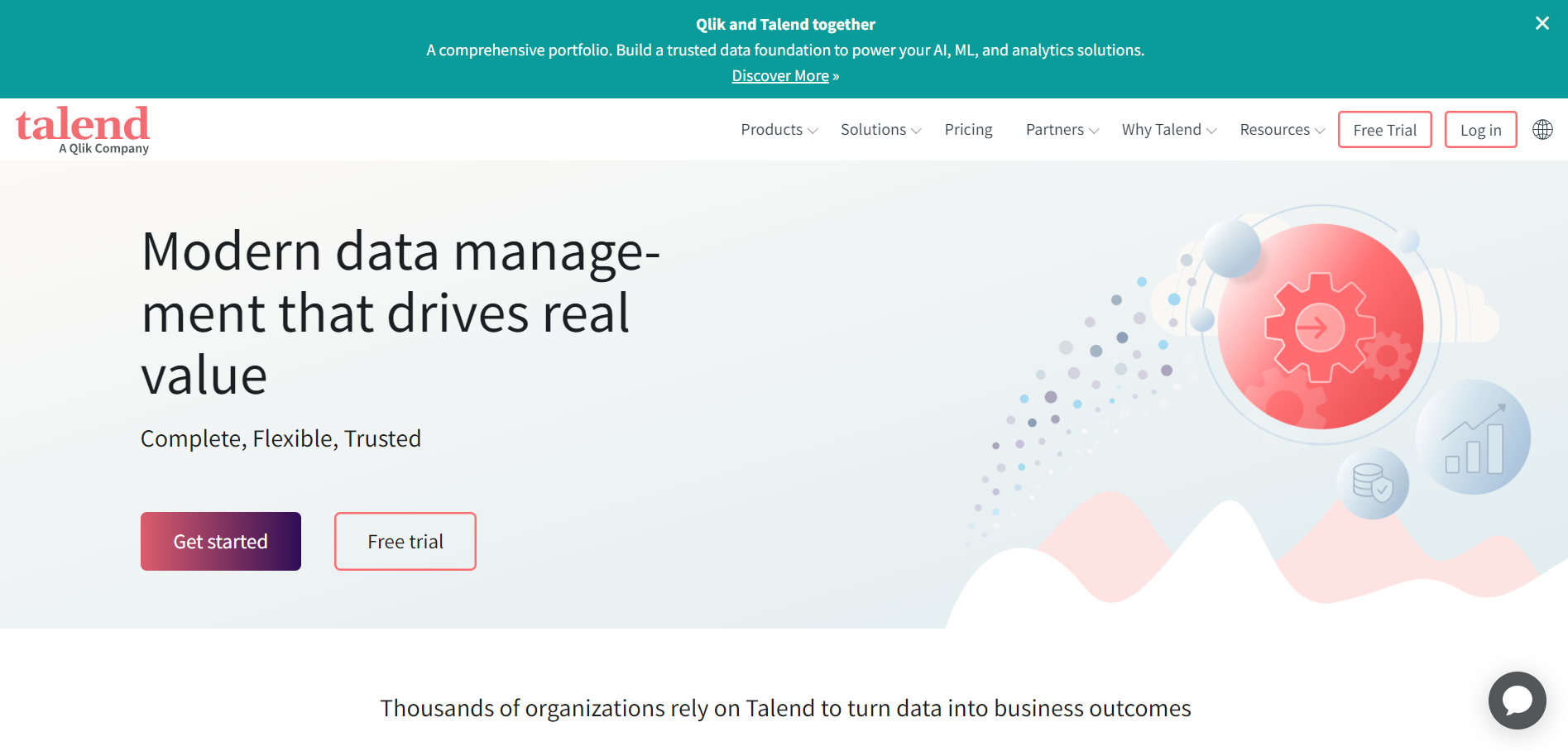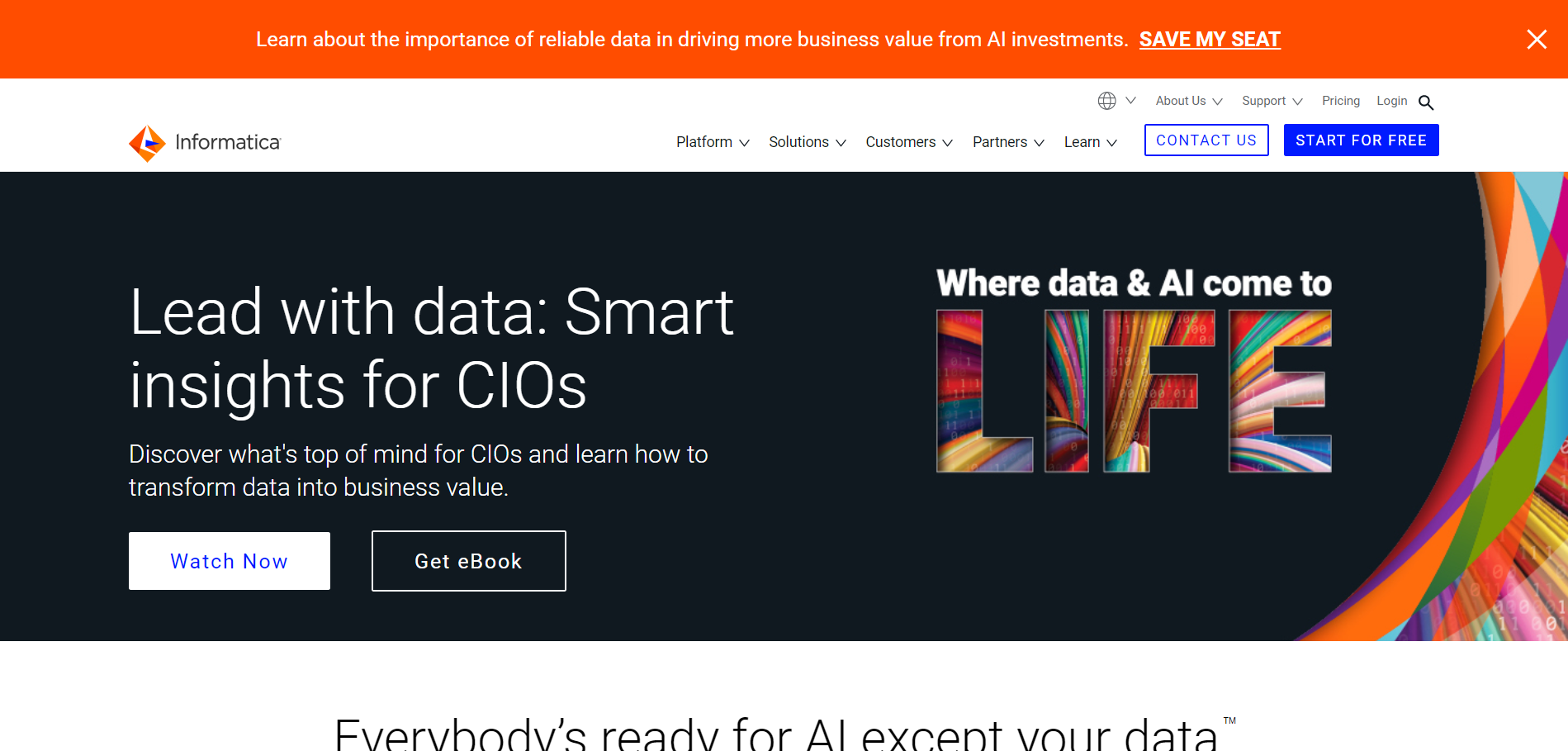In today’s data-driven world, businesses rely heavily on data integration tools to streamline their data workflows. These tools are crucial in extracting, transforming, and loading (ETL) data from various sources into a unified system. Selecting the right data integration tool is essential for optimizing efficiency, ensuring data quality, and supporting scalability as your business grows.
Among the leading data integration tools are Talend and Informatica, renowned for their robust capabilities and extensive feature sets. In this blog Talend vs Informatica, we will compare Talend and Informatica in-depth, helping you determine which tool best suits your organization’s data integration needs.
Table of Contents
Overview of Talend

G2 Rating: 4(65)
Capterra Rating: 4.2(23)
Talend is a data integration platform that enables businesses to manage their data more effectively. It offers a comprehensive suite of tools for ETL, data quality, and data management. Talend is designed to be flexible and user-friendly, making it accessible to a wide range of users, from small businesses to large enterprises.
Key Features of Talend
- Support for Big Data and Cloud-Native Integration: Talend is equipped to handle big data workloads and integrates seamlessly with cloud platforms like AWS, Azure, and Google Cloud.
- Customization and Flexibility: Talend’s allows for extensive customization, enabling users to create custom components and connectors that meet their needs.
- Data Quality and Governance: Talend integrates data quality tools within its platform, offering features such as data cleansing, profiling, and governance to ensure accurate and reliable data.
Use Cases of Talend
- Talend is well-suited for businesses of all sizes that require a flexible, user-friendly, and scalable data integration tool.
- Its model makes it an attractive option for organizations that need a customizable solution without the overhead of expensive licensing fees.
Overview of Informatica

G2 Rating: 4.3(519)
Capterra Rating: 4.3(14)
Informatica is a comprehensive data management platform offering powerful ETL capabilities and advanced data quality, governance, and automation tools. It is designed to support large enterprises with complex data environments, providing a scalable and secure solution for managing vast data.
Key Features of Informatica
- Robust ETL Capabilities: Informatica handles complex data workflows, making it ideal for enterprises with demanding data integration needs.
- AI-Driven Automation and Advanced Data Quality Management: Informatica leverages AI to automate data management tasks, ensuring that data is accurate, consistent, and compliant with regulations.
- Enterprise-Grade Performance: Informatica’s architecture is optimized for large-scale data processing, delivering high performance even in the most demanding environments.
- Governance and Compliance: Informatica offers comprehensive tools for data governance, helping organizations maintain compliance with industry standards and regulations.
Use Cases of Informatica
- Informatica is best suited for large enterprises that require a robust, scalable, and secure data integration solution.
- Its advanced features make it a preferred choice for industries with stringent data governance and compliance requirements, such as finance, healthcare, and government.
Talend vs Informatica: Feature Comparison
| Feature | Talend | Informatica |
| Focus | Data Ingestion, ETL, ELT, Data Quality, Data Governance | Data Ingestion, ETL, ELT, Data Quality, Data Governance |
| Ease of Use | User-friendly interface with a drag-and-drop design environment. | Varies from low-code to high-code, depending on the product. |
| Data Connectors | 1000+ Connectors | 100+ prebuilt data connectors |
| Pricing | Subscription-based pricing with a 14-day free trial. | The pricing is consumption-based, with a 30-day free trial that only uses work email. |
| API Access | Provides REST API for integration and custom connectors. | Offers REST API, Connector Toolkit, and Informatica Developer Tool for advanced integrations. |
| Support | Comprehensive support, including community forums, documentation, and professional support options. | Comprehensive support options, including documentation and customer support. It depends on your pricing plan. |
| Security Certifications | GDPR, HIPAA, CCPA, ISO/IEC 27001 | SOC 1, SOC 2, SOC 3, HIPAA, GDPR, Privacy Shield. |
| Customizability of Connectors | High customizability through the Talend Component Kit and open-source community contributions. | High customizability through the Connector Toolkit and REST API connectors. |
| Vendor Lock-IN | Yes, as the Open Source Version has been Retired. | Yes |
| AI Capabilities | No | Yes, CLAIRE AI Model |
If you are looking for an Informatica alternative, you can also check out our blogs on Hevo vs Informatica and Informatica vs Matillion.
Detailed Comparison:
Integration Capabilities
- Talend
- Data Sources and Destinations: Talend offers a comprehensive range of connectors for various data sources, including databases, cloud platforms, and SaaS applications. It supports structured and unstructured data, providing more flexibility for complex data environments.
- Setup and Customization: Talend provides extensive customization options, allowing users to create custom components and connectors as needed.
- Informatica
- Extensive Connector Support: Informatica supports over 100+ connectors, covering various SaaS applications, relational databases, on-premise systems, and cloud platforms.
- Custom Connectors: Informatica’s Connector Toolkit allows users to create custom connectors, offering significant flexibility for unique integration requirements.
Ease of Use
- Talend
- Varied Skill Requirements: Talend offers tools catering to various skill levels, from low-code to high-code environments, accommodating business analysts and data engineers.
- Informatica
- No-Code Platform: Informatica offers a user-friendly no-code interface that simplifies the creation and management of data pipelines, making it approachable for users with limited technical backgrounds.
Pricing Model
- Talend
- Pricing Plans: Talend offers several pricing plans, including the Data Management Platform, Big Data Platform, and Data Fabric. Specific pricing details are not publicly available and require direct contact with Talend’s sales team.
- Cost Perception: Smaller businesses may find Talend’s pricing more accessible, although some users on review platforms consider it expensive, depending on the plan and features.
- Informatica
- Consumption-Based Pricing: Informatica uses a consumption-based pricing model measured in Informatica Processing Units (IPUs). Based on their data integration needs, organizations must subscribe to adequate IPUs.
- Cost Perception: Informatica’s pricing is often considered high by users, with reviews highlighting its cost as a significant factor for consideration.
Hevo excels in simplicity, speed, and flexibility, making it a better fit for many organizations compared to Talend and Informatica:
- Ease of Use: Hevo’s no-code platform is more user-friendly compared to Talend’s complexity and Informatica’s steep learning curve.
- Rapid Deployment: Hevo offers faster deployment, getting you up and running quicker than Talend and Informatica.
- Transparent Pricing: Hevo provides straightforward, competitive pricing, unlike the often high and unclear costs of Talend and Informatica.
Limitations
While Talend and Informatica offer robust data integration capabilities, each has limitations that could impact its suitability for different organizations. Understanding these limitations can help you make an informed decision based on your needs.
Limitations of Talend
- No Longer Open Source: Talend’s shift from an open-source model to a fully commercial offering limits flexibility and increases costs for users previously relying on the free version.
- Performance with Large Datasets: Talend may experience performance issues when handling large datasets, requiring additional tuning or resources to manage efficiently.
- Complex Advanced Features: While flexible, Talend’s advanced features can be complex and require significant technical expertise.
Limitations of Informatica
- High Cost: Informatica’s pricing can be pretty high, especially for smaller organizations or those with limited budgets, making it a less accessible option.
- Steep Learning Curve: Its extensive features and capabilities contribute to a steeper learning curve, which can be challenging for new users and may require substantial training.
- Complex Setup and Configuration: Informatica’s setup and configuration can be intricate, often necessitating more time and effort than more streamlined solutions.
Explore another important comparison in the data integration space by reading our blog on Talend vs Airflow to determine which tool best fits your needs.
Why is Hevo a better option than Talend and Informatica?
Hevo is a modern data integration platform that simplifies syncing and integrating data from various sources. It offers a no-code interface and real-time data replication, making it an attractive choice for organizations seeking an efficient and user-friendly solution. Some of the features that separate Hevo from Talend and Informatica are:
- Ease of Use: Hevo’s no-code interface simplifies data pipeline management, making it more accessible than Informatica and Talend.
- Rapid Deployment: Hevo allows quick setup and deployment, outperforming the lengthy setups of Informatica and Talend.
- Real-Time Integration: Hevo supports real-time data replication with CDC, offering a simpler solution compared to Informatica’s complex features.
- Cost-Effectiveness: Hevo offers competitive pricing, including a Free plan, contrasting with the higher costs of Informatica and Talend’s opaque pricing.
- Flexibility: Hevo provides essential flexibility without complex configurations, balancing ease of use with functionality.
- Customer Support: Hevo delivers robust support with standard and premium plans, more accessible than Informatica and Talend’s varied support levels.
You can also read more about:
Conclusion
Talend and Informatica are two very powerful tools for ETL and data integration, each having its own list of pros and potential cons. On one hand, Talend offers great ease of use, flexibility, and cost-effectiveness for small to medium-scale businesses that need flexible data integration. On the other hand, advanced features of Informatica, its scalability, and performance make it a preferred choice in large enterprises with complex environments and stringent governance requirements.
Hevo, with a no-code interface, real-time data replication, and very affordable pricing, is the alternative. The ease of use and fast speed of deployment set Hevo apart from competitors, more so for organizations looking to solve a certain need quickly without extensive development, as is required by Talend, or at too high a cost, which applies to Informatica.
FAQ on Talend vs Informatica
1. Will Talend work for enterprise customers?
Talend will work fine in large enterprises where flexibility and customization are the top priorities. Otherwise, Informatica has an edge in handling complex data environments.
2. Will Informatica work for small-medium businesses?
Though Informatica is really power-packed, its price tag and complexity could be reconsidered for smaller-scale companies. Talend would be more fitting in that regard.
3. How does Talend stack up against Informatica in Cloud Integration?
Both Talend and Informatica are great options for Cloud Integration, but Talend’s open-source nature gives it significantly more flexibility in terms of creating custom cloud-based solutions at little or no extra cost. Informatica offers more enterprise-grade, packaged, out-of-the-box Cloud solutions.
4. On Community Support, which tool has an edge over the other?
Talend has a very strong community, especially their Open Source Edition. Informatica also has a large user base with professional support options; it’s all a bit more enterprise-oriented.










